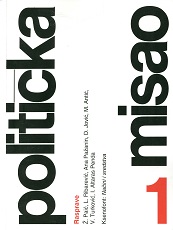Juraj Križanić između Augustina i Hobbesa
JURAJ KRIŽANIĆ BETWEEN AUGUSTINE AND HOBBES
Author(s): Goran SunajkoSubject(s): Politics / Political Sciences
Published by: Fakultet političkih znanosti u Zagrebu
Keywords: Augustine; God; civitas Dei; civitas terrena; church; state; Hobbes; royal worship; Križanić; political theology; sovereignty
Summary/Abstract: The author designates the Croatian thinker Juraj Križanić as a philosopher of politics, i.e. a modern political theorist who, on the one hand, founds his postulates on traditional theological thought, and, on the other, takes into account the postulates of modern political theory. As a theologian, Križanić bases his conception of history and theology on the providentialism of St. Aurelius Augustine, and his political theory on the acceptance of a part of the thought of his contemporary Thomas Hobbes. The theoretical position – political theology, positions him precisely between the political-theological postulates of Augustine and the political-theoretical hypotheses of Hobbes. In agreement with Augustine, Križanić concludes that the political community (state) has its foundation in God and the values comprised in him, which is especially manifest in Providence and royal worship as basis of the internal structure of the state. But, in agreement with Hobbes, Križanić understands that the mission of the state decreed by Providence operates within the earthly state and the secular political frameworks, and that, on the other hand, the king instituted by the will of God has his foundation also in the political body (the people), and this ranks Križanić among the modern political theorists.
Journal: Politička Misao
- Issue Year: XLIX/2012
- Issue No: 01
- Page Range: 152-168
- Page Count: 17
- Language: Croatian

